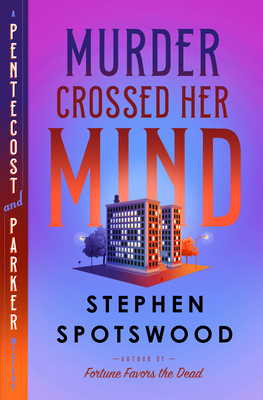 Murder Crossed Her Mind (Pentecost and Parker #4) by Stephen Spotswood
Murder Crossed Her Mind (Pentecost and Parker #4) by Stephen Spotswood Format: eARC
Source: supplied by publisher via NetGalley
Formats available: hardcover, paperback, large print, audiobook
Genres: historical fiction, historical mystery, mystery
Series: Pentecost and Parker #4
Pages: 384
Published by Doubleday Books on December 5, 2023
Purchasing Info: Author's Website, Publisher's Website, Amazon, Barnes & Noble, Kobo, Bookshop.org, Better World Books
Goodreads
The latest action-packed installment in the Nero Award-winning Pentecost & Parker Mystery series follows Lillian and Will tracking the suspicious disappearance of a woman who might have known too much. From the author of Fortune Favors the Dead and Murder Under Her Skin.
Vera Bodine, an elderly shut-in with an exceptional memory, has gone missing and famed detective Lillian Pentecost and her crackerjack assistant Willowjean "Will" Parker have been hired to track her down. But the New York City of 1947 can be a dangerous place, and there's no shortage of people who might like to get ahold of what's in Bodine's head.
Does her disappearance have to do with the high-profile law firm whose secrets she still keeps; the violent murder of a young woman, with which Bodine had lately become obsessed; or is it the work she did with the FBI hunting Nazi spies intent on wartime sabotage? Any and all are on the suspect list, including their client, Forest Whitsun, hotshot defense attorney and no friend to Pentecost and Parker.
The clock is ticking to get Bodine back alive, but circumstances conspire to pull both investigators away from the case. Will is hot on the trail of a stickup team who are using her name--and maybe her gun--for their own ends. While Lillian again finds herself up against murder-obsessed millionaire Jessup Quincannon, who has discovered a secret from her past--something he plans to use to either rein the great detective in . . . or destroy her.
To solve this mystery, and defeat their own personal demons, the pair will have to go nose-to-nose with murderous gangsters, make deals with conniving federal agents, confront Nazi spies, and bend their own ethical rules to the point of breaking. Before time runs out for everyone.
My Review:
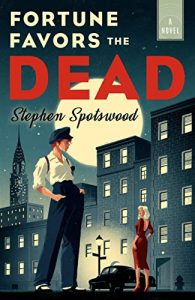 It’s still 1947 in this fourth entry in the Pentecost and Parker series, not too long after the conclusion of the previous book, Secrets Typed in Blood, and still very much under the influence of those events.
It’s still 1947 in this fourth entry in the Pentecost and Parker series, not too long after the conclusion of the previous book, Secrets Typed in Blood, and still very much under the influence of those events.
Willowjean Parker, is private detective Lillian Pentecost’s right-hand woman, still a bit sensitive about her roots as a ‘cirky girl’ and still in a bit of mourning for the people she left behind when she ran away FROM the circus after running away TO that circus to escape her abusive father.
But she’s proud of her accomplishments as a licensed private detective, and embarrassed, chagrined and downright ashamed when she gets mugged by a couple of two-bit con artists working Coney Island, getting coshed with her own sap and losing her favorite purse with its IDs, keys, and brand new – and registered – gun when she breaks up what she believed was an attempted rape – only to get suckered into a situation that she really should have seen coming a mile away.
Which turns out to be a kind of metaphor for this whole case, as in her haste to cover up her own mess she falls right into an even bigger one – and very nearly loses her boss’ trust into the bargain.
It starts as a missing persons case, brought to Pentecost and Parker by their least favorite lawyer, Forest Whitsun. When Whitsun had Pentecost on the stand in their latest confrontation, he implied that she was not just physically incapacitated by her progressing multiple sclerosis, but mentally compromised into that very bad bargain.
Having him show up at their door as a prospective client, that he trusts their expertise enough for him to ask Pentecost to help him locate a missing friend, is rather a surprise. Although not nearly as much of a surprise as discovering that Whitsun has actual friends and that any of them are female and almost, sorta/kinda, mother-figures in a life that seems bereft of all emotional contacts.
That his friend was a hoarder is a shock to everyone’s system. That she was so famous for her prodigious memory that she was the ace-in-the-hole for a high-powered white shoe law firm AND was recruited by the FBI during the late war is an even bigger shock.
That Will finds her body hidden in the piles of detritus choking her apartment – not so much.
But the ensuing shenanigans raise questions about Pentecost’s history, bring up the specters of one of her greatest enemies and poke holes in a whole lot of people’s lives. Because it’s pretty clear that Vera Bodine’s death was related to some secret that someone felt they had to kill to keep.
But the woman knew so many that it’s hard for even Pentecost and Parker to determine which of the many, many motives surrounding this very secretive woman was the one that caused her death.
Before it causes, not a second woman to die, but a third. Or perhaps a fourth.
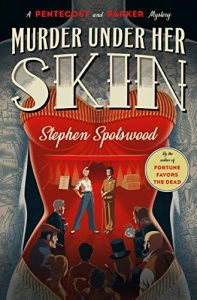 Escape Rating A++: Murder Crossed Her Mind was an actual, literally, honest-to-goodness one sitting read for me. I started it thinking I’d read for an hour or so before bed, and then just stayed there reading. And stayed. And STAYED. Until it was done nearly four hours later. Hence that A++ rating because I simply could not put this down until Pentecost and Parker knew everything and staged a great – but still slightly speculative – reveal at the end.
Escape Rating A++: Murder Crossed Her Mind was an actual, literally, honest-to-goodness one sitting read for me. I started it thinking I’d read for an hour or so before bed, and then just stayed there reading. And stayed. And STAYED. Until it was done nearly four hours later. Hence that A++ rating because I simply could not put this down until Pentecost and Parker knew everything and staged a great – but still slightly speculative – reveal at the end.
Even though they, and I, both know that those things work better on TV than they do in a real case. Then again, their lawyer-client has been compared to Perry Mason, so the TV-worthy ending fits right into the feel of, well, everything.
What continues to make this series shine is the voice of its narrator, ‘Will’ Parker, who serves as Lillian Pentecost’s right-hand and leg-woman, as well as, increasingly as the series goes on, her investigative partner.
What makes this series, let’s call it ‘inspired by’ by the classic Nero Wolfe series, is that while the stories are set in the immediate post-World War II period, and is clearly heading straight into the strait-jacket of the 1950s, Will’s voice feels more contemporary to us even as she observes the times in which she lives.
Which works because, while we know the date of the period Will is narrating for the story, we don’t know when she’s narrating it FROM. It’s obviously later, she’s clearly older, sadder and wiser, but the world changed a LOT from the late 1940s to, for example, the 1970s and 1980s. Will’s in her 20s when this story takes place, so the possibility that she’s looking back from 30 or 40 years on and is still alive to do so is quite plausible and allows her to be a bit outside her time.
What made the case work, both as a mystery and as an interesting story in its own right, was the mysterious figure of Perseverance Bodine at its heart. She had the gift of perfect recall, and that gift gave her a financially secure life while allowing her to work in the shadows. But as a woman, it was all too easy for her to be seen as a mere helper with a freakishly useful talent rather than as the mover and shaker she could have been – or perhaps should have been.
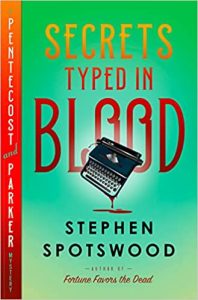 It was also a bit different because it was never about what enemies Vera might have made – because she didn’t. Instead, it was about which secret someone could least afford her to reveal, which made the investigation just that much more complicated.
It was also a bit different because it was never about what enemies Vera might have made – because she didn’t. Instead, it was about which secret someone could least afford her to reveal, which made the investigation just that much more complicated.
I was enthralled from the very first page, and this one just didn’t let go of me until the end. I’ve been just as caught up in every single one of the Pentecost and Parker mysteries so far, from their very first outing in Fortune Favors the Dead, through Murder Under her Skin, Secrets Typed in Blood and now this latest entry in the series, which dammit ends on a ginormous cliffhanger. So there’d better be a FIFTH book in this fantastic series! I just hope we don’t have too long to wait…

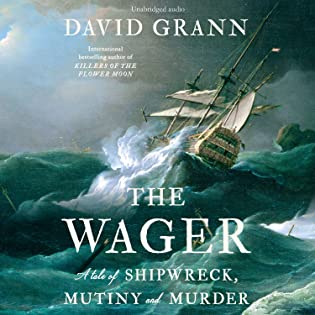 The Wager: A Tale of Shipwreck, Mutiny and Murder by
The Wager: A Tale of Shipwreck, Mutiny and Murder by 
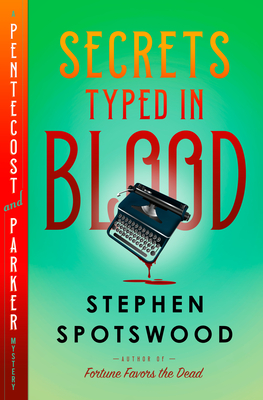 Secrets Typed in Blood: A Pentecost and Parker Mystery by
Secrets Typed in Blood: A Pentecost and Parker Mystery by 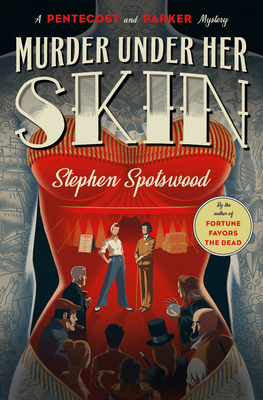 Murder Under Her Skin (Pentecost and Parker, #2) by
Murder Under Her Skin (Pentecost and Parker, #2) by 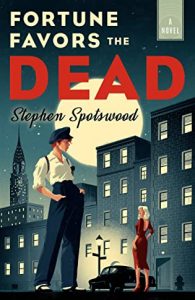 Escape Rating A+: The
Escape Rating A+: The 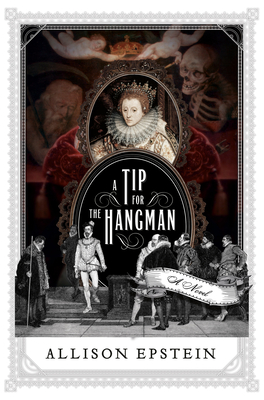 A Tip for the Hangman by
A Tip for the Hangman by 

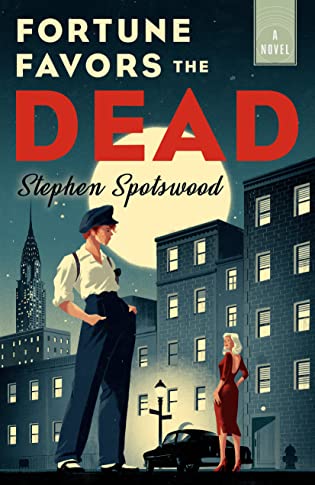 Fortune Favors the Dead (Pentecost and Parker, #1) by
Fortune Favors the Dead (Pentecost and Parker, #1) by 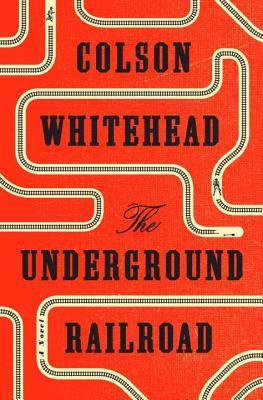 The Underground Railroad by
The Underground Railroad by